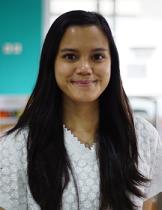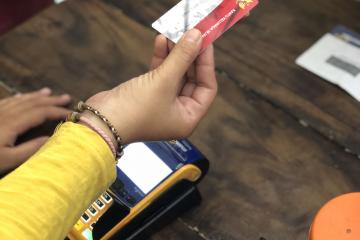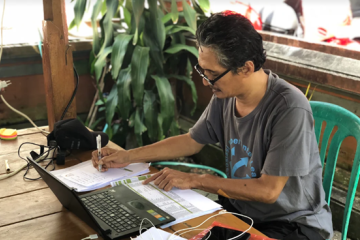
Establishing effective research collaboration: Finding common ground between policymakers and academics
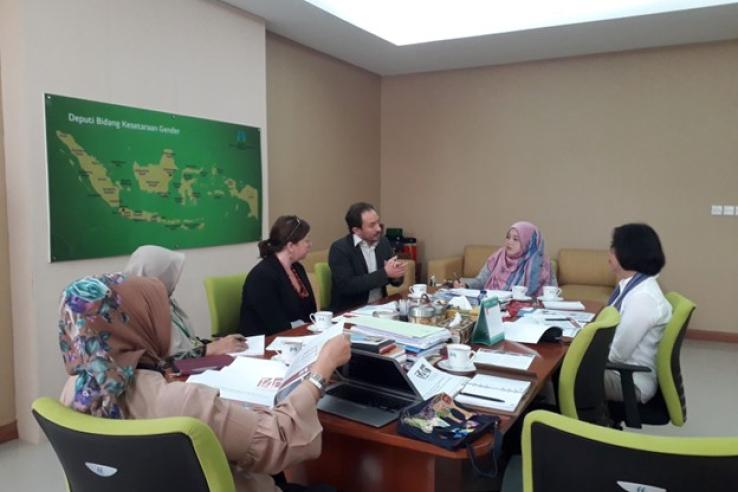
Read part one of this post on "Research to Action: Data Sharing for Policy and Program Evaluation."
In Indonesia, there has been growing interest from governments at all levels to adopt a broader culture of evidence- and data-driven policymaking to meet the needs of the country’s most marginalized constituents.
One important aspect of increasing evidence adoption is collaboration between policymakers and researchers. However, bridging research and policymaking is often not a straightforward process: the fast-paced policy environment, the wide range of actors that contribute to the decision-making process, and the relevance of existing evidence are some of the challenges that create barriers to achieving effective government-researcher collaborations.
With the goal of addressing these barriers, J-PAL Southeast Asia (SEA) hosted a webinar on May 17 featuring Anindito Aditomo, Head of the Agency for Standardization, Curriculum, and Assessment in Education, Ministry of Education, Culture, Research and Technology/MoECRT; Agus Eko Nugroho, Chairman of the Research Organization for Governance, Economy, and Community Welfare, National Research and Innovation Agency; Teguh Dartanto, Dean of the Faculty of Economics and Business, University of Indonesia; and Rema Hanna, co-Scientific Director of J-PAL SEA.
We also had the opportunity to hear opening remarks from Kirsten Bishop, Minister Counsellor of Governance and Human Development, Australian Embassy Jakarta; and a keynote speech from Teuku Faisal Fathani, Acting Director of Research, Technology, and Community Services, MoECRT; and Benjamin Olken, co-Scientific Director of J-PAL SEA.
Below are the key takeaways from the webinar.
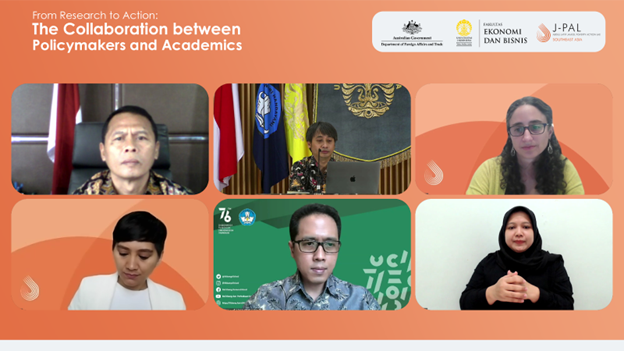
1. A culture of evidence-based policymaking starts with the policy community learning from existing workable practices
Incorporating evidence into the process of policy formulation can at times be challenging for the policy community, as not everyone may have the same level of understanding on how to adopt evidence-based policies and programs at scale. Anindito Aditomo (MoECRT) noted that collaborating with experienced researchers can be an entry point to establish the first contact with the culture of evidence- and data-driven policymaking.
Anindito highlighted how the experience of MoECRT in collaborating with J-PAL SEA and INOVASI, A DFAT-funded initiative, have aided the ministry in overcoming institutional barriers when formulating important policy decisions such as Merdeka Belajar (Emancipated Learning), a comprehensive education reform which included the decision to terminate high-stakes national exit exams (Ujian Nasional).
Today, MoECRT regularly collects administrative data on exam results, classroom practices, headmasters, and teachers at the school level that equip MoECRT to tailor interventions to address regional problems.
2. A well-established research identity and an effective dissemination method are key to maintain the relevance of academic research
Research is most effective when it fills in existing knowledge gaps—a point highlighted by Teguh Dartanto (FEB UI) in the webinar.
When there is a policy window or a time-sensitive policy question that needs to be addressed, Teguh pointed out that researchers need to be ready to answer the call for collaboration. However, policymakers often experience difficulty in identifying who they should reach out to since it is sometimes unclear where the expertise of each researcher lies.
One way to address this is by building research clusters in universities. An example of this is the Institute for Advanced Research in Economics and Business at the University of Indonesia, which does not only aim to pave the way for more effective research collaboration but also to contribute to strengthening the identity of local researchers.
Furthermore, another window of opportunity is related to improving research dissemination methods. Due to the gap in expertise, not all academic papers are consumable by policymakers. Research results need to be translated into a more digestible format, such as policy briefs or white papers, and disseminated to a wider audience—something that is also core to the mission of J-PAL. Making the right information "viral" can serve as incentives for researchers to maintain the relevancy of their work.
3. Joint research funding and ease of conducting research collaborations are top priorities for the Government of Indonesia
Establishing joint research funds can also help to strengthen research collaborations. As mentioned by Teuku Faisal Fathani (MoECRT), less than 0.1 percent of Indonesia's GDP is allocated for research and development expenditure in 2019—compared to the ASEAN average of 0.7 percent.
Opening doors for private sector firms, donor agencies, and other organizations to match the research funds allocated by ministry agencies thus presents a strategic opportunity: not only will this set the stage for the creation of more evidence-based policies, but it can also help to strengthen interactions between academics, civil society, donors, and policymakers.
Another important point highlighted by Agus Eko Nugroho (BRIN) was related to the need for an effort to ease the process of setting up research collaborations.
Researchers and policymakers often face technical challenges that can potentially result in evidence being isolated in the academic sphere instead of being utilized properly for policymaking. In addressing this issue, much like J-PAL, BRIN works to connect both local and visiting researchers to relevant government agencies, to co-create research proposals, and establish a research agenda for long-term collaborations.
Looking forward
This discussion clearly demonstrated that government agencies and research institutions share the same goal: The creation of a mutually-aligned collaboration, one that will be able to respond to critical issues in Indonesia and ultimately improve people’s lives.
As awareness of the importance of evidence-based policymaking grows, so too is the demand for engagement between policymakers and academic researchers. J-PAL SEA continues to put government partnerships and effective dissemination at the forefront of our work, and we look forward to more discussions on how to build a sustainable culture of evidence-based policymaking that can lead to the generation of innovative solutions.

